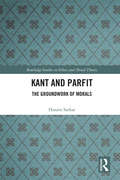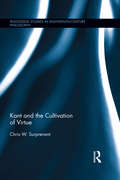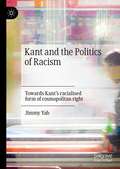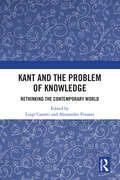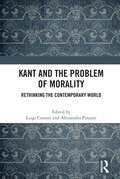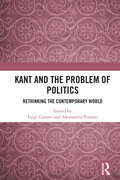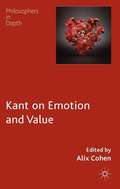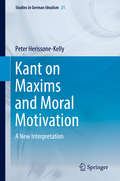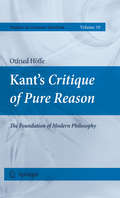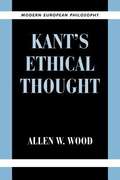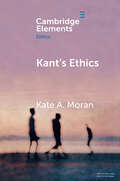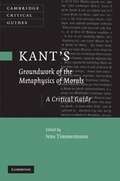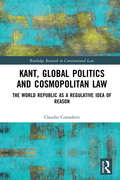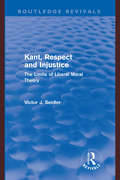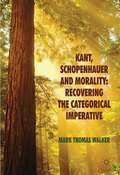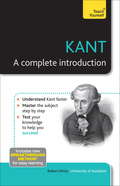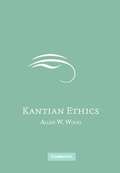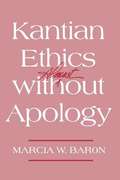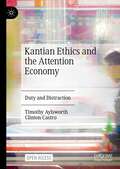- Table View
- List View
Kant and Parfit: The Groundwork of Morals (Routledge Studies in Ethics and Moral Theory)
by Husain SarkarDerek Parfit’s On What Matters is widely recognized as elegant, profound, and destined to change the landscape of moral philosophy. In Volume One, Parfit argues that the distinct—indeed, powerfully conflicting—theories of deontology and contractualism can be woven together in a way so as to yield utilitarian conclusions. Husain Sarkar in this book calls this, The Ultimate Derivation. Sarkar argues, however, that this derivation is untenable. To underwrite this conclusion, this book traverses considerable Parfitian terrain. Sarkar shows why Parfit hasn’t quite solved what Sidgwick had called "the profoundest problem in ethics"; he offers a reading of Kant, Rawls, and Scanlon that reveals Parfit’s keen utilitarian bias; and he demonstrates why Parfit’s Triple Theory does not succeed in its task of unifying conflicting moral theories (without making substantial utilitarian assumptions). The final chapter of the book is about meta-ethics. It shows that Parfit’s Convergence Principle is mistaken even though it unveils Parfit’s utterly humane concerns: Moral philosophers are not, as Parfit thinks, climbing the same mountain. But for all that, Sarkar maintains, Parfit’s book is arguably the greatest consequential tract in the history of moral philosophy.
Kant and the Cultivation of Virtue: Kant And The Cultivation Of Virtue (Routledge Studies in Eighteenth-Century Philosophy)
by Chris W. SurprenantIn this book, Chris W. Surprenant puts forward an original position concerning Kant’s practical philosophy and the intersection between his moral and political philosophy. Although Kant provides a detailed account of the nature of morality, the nature of human virtue, and how right manifests itself in civil society, he does not explain fully how individuals are able to become virtuous. This book aims to resolve this problem by showing how an individual is able to cultivate virtue, the aim of Kant’s practical philosophy. Through an examination of Kant’s accounts of autonomy, the state, and religion, and their effects on the cultivation of virtue, Surprenant develops a Kantian framework for moral education, and ultimately raises the question of whether or not Kantian virtue is possible in practice.
Kant and the Laws of Nature
by Michela Massimi Angela BreitenbachLaws of nature play a central role in Kant's theoretical philosophy and are crucial to understanding his philosophy of science in particular. In this volume of new essays, the first systematic investigation of its kind, a distinguished team of scholars explores Kant's views on the laws of nature in the physical and life sciences. Their essays focus particularly on the laws of physics and biology, and consider topics including the separation in Kant's treatment of the physical and life sciences, the relation between universal and empirical laws of nature, and the role of reason and the understanding in imposing order and lawful unity upon nature. The volume will be of great interest to advanced students and scholars of Kant's philosophy of science, and to historians and philosophers of science more generally.
Kant and the Politics of Racism: Towards Kant’s racialised form of cosmopolitan right
by Jimmy YabThis book proposes an account of the place of the theory of race in Kant’s thought as a central part of philosophical anthropology in his political system. Kant’s theory of race, this book argues, is integral to the analysis of the “Charakteristik” of the human species and determined by human natural predispositions. The understanding of his theory as such suggests not only an alternative reading to the orthodox narrative we have seen so far but also reveals the underlying centrality of the notion of human natural predispositions in a way that is consequential for Kant’s philosophy as a whole. What is the impact of Kant’s racial theory on his philosophy and political thought? Is Kant a consistent egalitarian or a partisan Universalist thinker? Is he the symbol of racist prejudices of his time? What is the influence of his racial hierarchy on his cosmopolitan right? Or more simply, is Kant racist? From a systematic examination of Kant relevant writings, this book provides answers to these questions and shed light on two fundamental problems of his theory of race for moral philosophy, namely: (1) the completeness of the character of the White race and (2) the dispossession of the character of the beauty and the dignity of human nature of the Negro race. These two issues, unperceived from the “orthodox” reading’s perspective, however, uncovered by the “heterodox” reading, not only shape Kant’s race thinking from the beginning to the end of his life, transform his cosmopolitan right into a non-universalist form of right, but merely define Kant as a fundamental racist thinker since he developed the anthropology, the philosophy, and the politics of racism in a systematic way.
Kant and the Problem of Knowledge: Rethinking the Contemporary World
by Alessandro Pinzani Luigi CarantiThis book examines Kant’s contributions to the theory of knowledge and studies how his writings can be applied to address contemporary epistemological issues. The volume delves into the Kantian ideas of transcendental idealism, space, naturalism, epistemic normativity, communication, and systematic unity. The essays in the volume study Kant’s theories from a fresh perspective and offer new arguments for assenting that knowledge cannot account for itself without acknowledging the fundamental role of the cognitive subject. In doing so, they suggest that we reconsider Kant’s views as a powerful alternative to naturalism. Featuring readings by well-known Kant specialists and emerging scholars with unorthodox approaches to Kant’s philosophy, the volume fills a significant gap in the existing scholarship on the philosopher and his works. It will be of great interest to scholars and researchers of knowledge, philosophy, and epistemology.
Kant and the Problem of Morality: Rethinking the Contemporary World
by Alessandro Pinzani Luigi CarantiThis book examines the significance of Kant’s moral philosophy in contemporary philosophical debates. It argues that Kant’s philosophy can still serve as a guide to navigate the turbulence of a globalized world in which we are faced by an imprescriptible social reality wherein moral values and ethical life models are becoming increasingly unstable. The volume draws on Kantian ethics to discuss various contemporary issues, including sustainable development, moral enhancement, sexism, and racism. It also tackles general concepts of practical philosophy such as lying, the different kinds of moral duties, and the kind of motivation one needs for doing what we consider the right thing. Featuring readings by well-known Kant specialists and emerging scholars with unorthodox approaches to Kant’s philosophy, the volume will be of great interest to scholars and researchers of philosophy, politics and ethics. It will also appeal to moral theorists, applied ethicists and environmental theorists.
Kant and the Problem of Politics: Rethinking the Contemporary World
by Alessandro Pinzani Luigi CarantiThis book examines the significance of Kant’s political philosophy in the context of contemporary philosophical and political debates. In the last few decades, Kantian specialists have increasingly manifested a purely exegetic and philological interest in Kant’s oeuvre, while contemporary philosophers and scientists tend to use Kant with scant hermeneutical care, thus misrepresenting or misunderstanding his positions. This volume countervails these tendencies by focusing more on specific themes of contemporary relevance in Kant’s writings. It looks to Kant’s political thought for insight on tackling issues such as freedom of speech, democracy and populism, intergenerational justice, economic inequality, money, poverty, international justice, and gender/feminism. Featuring readings by well-known Kant specialists and emerging scholars with unorthodox approaches to Kant’s philosophy, the volume fills a significant gap in the existing scholarship on the philosopher and his works. It will be of great interest to scholars and researchers of philosophy, politics, and ethics.
Kant on Emotion and Value
by Alix CohenBy combining new cutting-edge essays and reprints by leading Kant scholars and Kantian philosophers, this volume offer the first comprehensive assessment of Kant's account of the emotions and their connection to value, whether in his philosophy of mind, ethics, aesthetics, religion and politics. Through a mixture of interpretation and critical discussion, the essays in this volume illuminate the various aspects of Kant's distinctive approach to the emotions and demonstrate its continuing relevance to philosophical debates. This collection will enrich current debates within Kantian scholarship as well as beyond, and will be of great interest to upper-level students and scholars of Kant, value theory, philosophy of emotion and aesthetics.
Kant on Maxims and Moral Motivation: A New Interpretation (Studies in German Idealism #21)
by Peter Herissone-KellyThis book outlines and circumvents two serious problems that appear to attach to Kant’s moral philosophy, or more precisely to the model of rational agency that underlies that moral philosophy: the problem of experiential incongruence and the problem of misdirected moral attention. The book’s central contention is that both these problems can be sidestepped. In order to demonstrate this, it argues for an entirely novel reading of Kant’s views on action and moral motivation. In addressing the two main problems in Kant’s moral philosophy, the book explains how the first problem arises because the central elements of Kant’s theory of action seem not to square with our lived experience of agency, and moral agency in particular. For example, the idea that moral deliberation invariably takes the form of testing personal policies against the Categorical Imperative seems at odds with the phenomenology of such reasoning, as does the claim that all our actions proceed from explicitly adopted general policies, or maxims. It then goes on to discuss the second problem showing how it is a result of Kant’s apparent claim that when an agent acts from duty, her reason for doing so is that her maxim is lawlike. This seems to put the moral agent’s attention in the wrong place: on the nature of her own maxims, rather than on the world of other people and morally salient situations. The book shows how its proposed novel reading of Kant’s views ultimately paints an unfamiliar but appealing picture of the Kantian good-willed agent as much more embedded in and engaged with the world than has traditionally been supposed.
Kant'S Metaphysics of Morals
by Lara DenisImmanuel Kant's Metaphysics of Morals (1797), containing the Doctrine of Right and Doctrine of Virtue, is his final major work of practical philosophy. Its focus is not rational beings in general but human beings in particular, and it presupposes and deepens Kant's earlier accounts of morality, freedom, and moral psychology. In this volume of newly-commissioned essays, a distinguished team of contributors explores the Metaphysics of Morals in relation to Kant's earlier works, as well as examining themes which emerge from the text itself. Topics include the relation between right and virtue, property, punishment, and moral feeling. Their diversity of questions, perspectives and approaches will provide new insights into the work for scholars in Kant's moral and political theory.
Kant's Critique of Pure Reason
by Otfried HöffeKant's "Critique of Pure Reason" is so outstanding among modern philosophical works, that it can be termed "the" foundation of modern philosophy. Schopenhauer termed it "the most important book ever to have been written in Europe." Otfried Höffe guides the reader through the "Critique" one step at a time, expounding Kant's thoughts, submitting them to an interpretation and drawing a summary conclusion, placing the work and its topics within the context of its modern successors. A "critical" interpretation of Kant's text reveals that he had something to say on many discussions that are said to have originated after his death. Reducing his argumentation to its central tenets, it can be made stronger and applicable to current problems. Kant's eventual concern, however, even when writing theoretical philosophy, lay with the practical. Elaborating this concern and its connection to Kant's theoretical philosophy is a prime tenet of this book.
Kant's Defense of Common Moral Experience
by Jeanine GrenbergIn this book, Jeanine Grenberg argues that everything important about Kant's moral philosophy emerges from careful reflection upon the common human moral experience of the conflict between happiness and morality. Through careful readings of both the Groundwork and the Critique of Practical Reason, Grenberg shows that Kant, typically thought to be an overly technical moral philosopher, in fact is a vigorous defender of the common person's first-personal encounter with moral demands. Grenberg uncovers a notion of phenomenological experience in Kant's account of the fact of reason, develops a new a reading of the fact, and grants a moral epistemic role for feeling in grounding Kant's a priori morality. The book thus challenges readings which attribute only a motivational role to feeling; and Fichtean readings which violate Kant's commitments to the limits of reason. This study will be valuable to students and scholars engaged in Kant studies.
Kant's Ethical Thought (Modern European Philosophy Series)
by Allen W. Wood Robert B. PippinThis is a major new study of Kant's ethics that will transform the way students and scholars approach the subject in future. Allen Wood argues that Kant's ethical vision is grounded in the idea of the dignity of the rational nature of every human being. It focuses for the first time on the central role played in Kant's ethical theory by the value of rational nature as an end itself. In addition, it shows the importance of Kant's systematic theory of human nature and history, and its implications for the structure, formulation, and application of Kant's moral principles. This comprehensive study will be of critical importance to students of moral philosophy, the history of ideas, political theory, and religious studies.
Kant's Ethics (Elements in Ethics)
by Kate A. MoranThe Element provides an overview of Immanuel Kant's arguments regarding the content of the moral law (the categorical imperative), as well as an exposition of his arguments for the bindingness of the moral law for rational agents. The Element also considers common objections to Kant's ethics.
Kant's Groundwork of the Metaphysics of Morals
by Jens TimmermannThe Groundwork of the Metaphysics of Morals is Kant's central contribution to moral philosophy, and has inspired controversy ever since it was first published in 1785. Kant champions the insights of 'common human understanding' against what he sees as the dangerous perversions of ethical theory. Morality is revealed to be a matter of human autonomy: Kant locates the source of the 'categorical imperative' within each and every human will. However, he also portrays everyday morality in a way that many readers find difficult to accept. The Groundwork is a short book, but its argument is dense, intricate and at times treacherous. This commentary explains Kant's arguments paragraph by paragraph, and also contains an introduction, a synopsis of the argument, six short interpretative essays on key topics of the Groundwork, and a glossary of key terms. It will be an indispensable tool for anyone wishing to study the Groundwork in detail.
Kant's Lectures on Ethics
by Lara Denis Oliver SensenThis is the first book devoted to an examination of Kant's lectures on ethics, which provide a unique and revealing perspective on the development of his views. In fifteen newly commissioned essays, leading Kant scholars discuss four sets of student notes reflecting different periods of Kant's career: those taken by Herder (1762–4), Collins (mid-1770s), Mrongovius (1784–5) and Vigilantius (1793–4). The essays cover a diverse range of topics, from the relation between Kant's lectures and the Baumgarten textbooks, to obligation, virtue, love, the highest good, freedom, the categorical imperative, moral motivation and religion. Together they will provide the reader with a deeper and fuller understanding of the evolution of Kant's moral thought. The volume will be of interest to a range of readers in Kant studies, ethics, political philosophy, religious studies and the history of ideas.
Kant's Theory of Virtue
by Anne Margaret BaxleyAnne Margaret Baxley offers a systematic interpretation of Kant's theory of virtue, whose most distinctive features have not been properly understood. She explores the rich moral psychology in Kant's later and less widely read works on ethics, and argues that the key to understanding his account of virtue is the concept of autocracy, a form of moral self-government in which reason rules over sensibility. Although certain aspects of Kant's theory bear comparison to more familiar Aristotelian claims about virtue, Baxley contends that its most important aspects combine to produce something different - a distinctively modern, egalitarian conception of virtue which is an important and overlooked alternative to the more traditional Greek views which have dominated contemporary virtue ethics.
Kant, Global Politics and Cosmopolitan Law: The World Republic as a Regulative Idea of Reason (Routledge Research in Constitutional Law)
by Claudio CorradettiWhy is there so much attention on Kant's global politics in present day law and philosophy? This book highlights the potential fruitfulness of Kant's cosmopolitan thought for understanding the complexities of the contemporary political world. It adopts a double methodological strategy by reconstructing a genealogical conceptual journey showing the development of international law, as well as introducing an interpretation of cosmopolitanism centred on Kant's theory of a metaphysics of freedom. The result is a novel focus on Kant's notion of the world republic. The hypothesis here defended is that the world republic stands as a way of thinking about international politics where the possibility of progression towards peace results from its use as a regulative idea.
Kant, Respect and Injustice: The Limits of Liberal Moral Theory (Routledge Revivals)
by Victor SeidlerIn this work, originally published in 1986, Victor Seidler explores the different notions of respect, equality and dependency in Kant’s moral writings. He illuminates central tensions and contradictions not only within Kant’s moral philosophy, but within the thinking and feeling about human dignity and social inequality which we take very much for granted within a liberal moral culture. In challenging our assumption of the autonomy of morality, Seidler also questions our understanding of what it means for someone to live as a person in his or her own right. The autonomy of individuals cannot be assumed but has to be reasserted against relationships of subordination. This involves a break with a rationalist morality, so that respect for others involves respect for emotions, feelings, desires and needs, and establishes a fuller autonomy as a basis for freedom and justice.
Kant, Schopenhauer and Morality: Recovering the Categorical Imperative
by Mark Thomas WalkerWhy should I be moral? Why should I give any weight to the interests of others simply for what they are, and not for what I can get out of it? After all, we are all different persons aren't we? So your good is your good and my good is mine. Why should your good, just as such, be mine as well? Why should I love my neighbour as myself if s/he is not myself? Drawing upon the work of two great German philosophers, Immanuel Kant (1724-1804) and Arthur Schopenhauer (1788-1860) this book radically challenges the assumptions lying behind these questions. After reading it you may never think of how you relate to others in quite the same way again.
Kant: A Complete Introduction: Teach Yourself
by Robert WicksWritten by Robert Wicks, a recognised Kant specialist who teaches at the University of Auckland, Kant: A Complete Introduction is designed to give you everything you need to succeed, all in one place. It covers the key areas that students are expected to be confident in, outlining the basics in clear jargon-free English, and then providing added-value features like summaries of key books, and even lists of questions you might be asked in your seminar or exam.The book uses a structure that mirrors many university courses on Freud and psychoanalysis - explaining and contextualising Kant's theories, which have been among the most influential in Philosophy. The book starts by introducing Kant and his way of thinking and arguing, before looking at how Kant answered three key questions: What can I know? What should I do? What may I hope? In doing so, Professor Wicks introduces the reader to all of Kant's key work, including The Critique of Pure Reason.Teach Yourself titles employ the 'Breakthrough method', which is designed specifically to overcome problems that students face.- Problem: "I find it difficult to remember what I've read."; Solution: this book includes end-of-chapter questions and summaries, and flashcards of key points available on-line and as apps- Problem: "Most books mention important other sources, but I can never find them in time."; Solution: this book includes key texts and case studies are summarised, complete with fully referenced quotes ready to use in your essay or exam.- Problem: "Lots of introductory books turn out to cover totally different topics than my course."; Solution: this book is written by a current university lecturer who understands what students are expected to know.
Kantian Dignity and Trolley Problems in the Literature of Richard Wright (American Literature Readings in the 21st Century)
by Michael WainwrightThis book examines the literature of African-American author Richard Wright and the philosophy of Immanuel Kant, arguing that Wright was not only the foremost proponent of minoritarian protest literature, but also a groundbreaking minoritarian exponent of philosophical literature. In presenting this argument, the volume defends trolley problems from the criticism that some philosophers level against them by promoting their use as an interpretive tool for literary scholars. Starting with Martha C. Nussbaum’s interventions in literary theory concerning Henry James and perceptive equilibrium, this book draws on the philosophical thoughts of her contemporaries—Philippa Foot, John Rawls, Judith Jarvis Thomson, and Derek Parfit—to analyze Uncle Tom’s Children, especially “Down by the Riverside,” alongside other works by Wright. This approach emphasizes Wright’s recognition of the importance and integrity of Kant’s concept of dignity.
Kantian Ethics
by Allen W. WoodIn this book, Allen W. Wood investigates Kant's conception of ethical theory, using it to develop a viable approach to the rights and moral duties of human beings.
Kantian Ethics Almost Without Apology
by Marcia W. BaronA defence of Kant's deontological conception of ethics. The author offers reflections on two supposed problems with Kant's ethics: that it leaves no room for supererogatory actions and that it overemphasizes the value of acting from duty.
Kantian Ethics and the Attention Economy: Duty and Distraction
by Clinton Castro Timothy AylsworthIn this open access book, Timothy Aylsworth and Clinton Castro draw on the deep well of Kantian ethics to argue that we have moral duties, both to ourselves and to others, to protect our autonomy from the threat posed by the problematic use of technology. The problematic use of technologies like smartphones threatens our autonomy in a variety of ways, and critics have only begun to appreciate the vast scope of this problem. In the last decade, we have seen a flurry of books making “self-help” arguments about how we could live happier, more fulfilling lives if we were less addicted to our phones. But none of these authors see this issue as one involving a moral duty to protect our autonomy.
